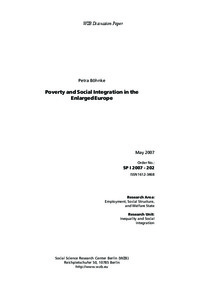Poverty and social integration in the enlarged Europe
"Empirical studies of the "old EU" countries suggest that poverty brings limited social relations and a lack of social support in its wake. At the same time, it is thought that in the transition countries, especially, individual supply crises are compensated for by a composite and sta...
| Main Author: | |
|---|---|
| Institution: | ETUI-European Trade Union Institute |
| Format: | TEXT |
| Language: | English |
| Published: |
Berlin
2007
WZB |
| Subjects: | |
| Online Access: | https://www.labourline.org/KENTIKA-19189834124919070169-Poverty-and-social-integration.htm |
| Summary: | "Empirical studies of the "old EU" countries suggest that poverty brings limited social relations and a lack of social support in its wake. At the same time, it is thought that in the transition countries, especially, individual supply crises are compensated for by a composite and stable network of social relations as well as a tradition of solidarity as a dominant value. This paper looks at the ways in which cultures of support vary across the enlarged Europe and to this end examines the link between poverty and social disintegration in countries characterised by different economic, cultural and welfare state regimes. The empirical analysis is concerned with (1) the distribution of social integration across the enlarged Europe, and (2) the verification of the hypothesis of accumulation and compensation in the individual countries. An additional step seeks to identify (3) the reasons for the variation across countries in the relationship between poverty and social disintegration. This macro-sociological perspective examines context effects that allow conclusions to be drawn regarding two hypotheses, in particular - that of stigmatisation and that of crowding out. Is poverty, which only affects a minority of the population in countries with a generally high standard of living, closely associated with stigmatisation, and does it lead to social withdrawal? Does a precarious system of social protection increase private solidarity and is support potential reduced in an environment of universal risk insurance? Within this same context, the paper also looks for evidence of (4) greater recourse to family support in precarious life situations. The data on which the study is based is taken from the European Quality of Life Survey - a representative survey of living conditions and quality of life in Europe that was carried out in October 2003." |
|---|---|
| Physical Description: | 31 p. Digital |

